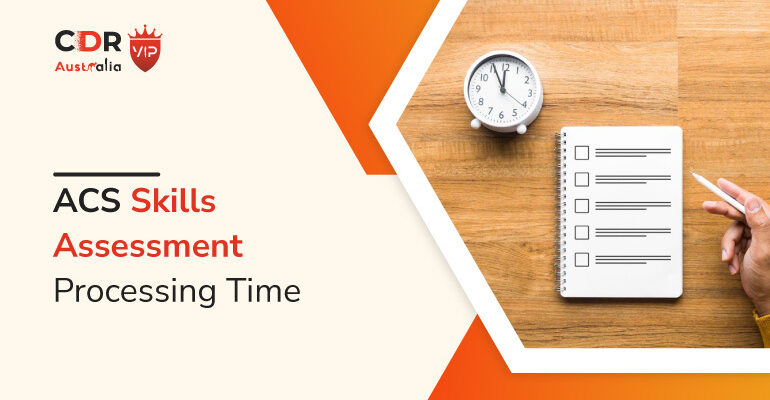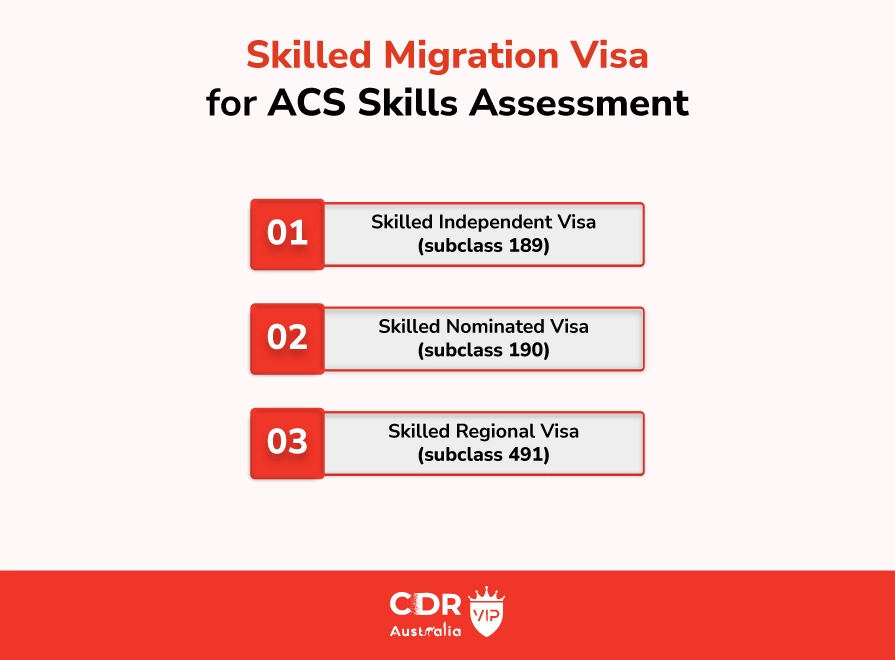ACS Skills Assessment Processing Time

ACS Skills Assessment Processing Time
Many people are exploring new opportunities in different countries, including Australia, in today’s globalized world. Australia is well renowned for its stunning landscapes, diverse culture, and thriving economy. One way to move to Australia is through a skilled migration visa, which requires an ACS (Australian Computer Society) Skills Assessment.
The ACS Skills Assessment is crucial in obtaining a skilled migration visa to Australia. It evaluates an individual’s skills, experience, and qualifications to ensure they meet the standards required to work in their nominated occupation in Australia.
Once an individual has received a positive skills assessment outcome from the ACS, they can apply for a skilled migration visa, such as the Skilled Independent Visa, Skilled Nominated Visa, or Skilled Regional Visa.
While obtaining a skilled migration visa can be complex and competitive, it allows skilled workers to live and work in Australia permanently. This pathway contributes to the country’s economic growth and development, as qualified professionals bring valuable skills and experience to the workforce.
If you are a skilled worker interested in exploring new opportunities in Australia, the skilled migration visa may be the right option. By completing the ACS Skills Assessment and meeting the eligibility criteria for the visa subclass, you can start a new chapter in your career and life in Australia.
What is ACS Skills Assessment?
The ACS (Australian Computer Society) Skills Assessment is a process that evaluates the skills, qualifications, and experience of individuals who are seeking to migrate to Australia on a skilled migration visa. It is a mandatory requirement for applicants who wish to apply under specific visa subclasses.
The Australian Computer Society conducts the ACS Skills Assessment, the professional association for Australia’s ICT (Information and Communication Technology) sector. The assessment evaluates an individual’s education, work experience, and English language proficiency to ensure they meet the requirements to work in their nominated occupation in Australia.
The ACS Skills Assessment has different requirements and processes depending on the applicant’s nominated occupation and level of qualification. For example, applicants with a tertiary ICT qualification from an Australian educational institution may be eligible for a fast-tracked assessment process.
The outcome of the ACS Skills Assessment is a report that provides an assessment of the applicant’s skills and suitability for their nominated occupation in Australia. A positive result from the evaluation is required to apply for a skilled migration visa.
Overall, the ACS Skills Assessment is essential for skilled professionals who wish to migrate to Australia. It ensures that only those who meet the required standards for their nominated occupation get granted a skilled migration visa, contributing to the quality of Australia’s workforce and economic growth and development.
Skilled Migration Visa for ACS Skills Assessment
Here are some differences between the three visa subclasses:

1. Skilled Independent Visa (subclass 189)
This visa is for experienced workers who have yet to be nominated by a state or territory government, an employer, or a family member. To be eligible for this visa, an individual must have an occupation on the (SOL) skilled occupation list and score at least 65 points in the points-based system.
2. Skilled Nominated Visa (subclass 190)
This visa is for skilled workers designated by a state or territory government. To be eligible for this visa, an individual must have an occupation on the professional occupation list and score at least 65 points in the points-based system. In addition, the applicant must have a nomination from a state or territory government agency.
3. Skilled Regional Visa (subclass 491)
This visa is for skilled workers willing to live and work in regional Australia. To be eligible for this visa, an individual must have an occupation on the suitable occupation list and score at least 65 points in the points-based system. Additionally, the applicant must get nominated by a territory government agency, a state, or an eligible family member living in an established regional area.
Must Read: How to write a perfect Employment Reference Letter for ACS RPL Report? 📚📚
The processing time for each visa subclass varies, and it can take several months to receive a decision. The processing time is affected by various factors, such as the assessment’s complexity, the application’s completeness, and the number of applications getting processed.
The skilled migration visas allow the individual to live and work in Australia permanently, with the opportunity to apply for Australian citizenship in the future.
The visa subclasses allow skilled workers to live and work in Australia permanently and contribute to the country’s economic growth and development. Each visa subclass has different eligibility criteria and requirements, and it is essential to understand them before applying.
The assessment includes evaluating an applicant’s education, work experience, and professional development. The ACS assesses whether an applicant’s qualifications and experience meet the standards required for the nominated occupation in Australia.
Factors Affecting ACS Skills Assessment Processing Time
The processing time for the ACS skills assessment can vary depending on several factors, including:
1. Completeness of Application
The completeness of an application is crucial in determining the processing time for the ACS skills assessment. An application needing necessary documents or information can significantly delay the assessment process. Therefore, ensuring that your application is complete and all the required documents for ACS are attached is essential.
2. The Complexity of Assessment
The skills assessment for skilled migration involves assessment applications and can be complex, affecting the processing time. Certain occupations require a more thorough evaluation of an applicant’s qualifications and experience.
Priority processing is available for skilled visa subclasses such as the Skilled Nominated Visa (subclass 190) or Skilled Regional Visa (subclass 491). It is important to ensure that the skills assessment application is accurate and complete to avoid delays in processing.
3. ACS Workload
The volume of applications the ACS receives can also affect the processing time. If there is a high volume of applications, it can take longer to process them all.
4. Response Time
The processing time for the ACS skills assessment pathways can also be affected by the time the applicant takes to answer any queries or requests for additional information from the ACS.
5. Peak Periods
The processing time can also be affected by peak periods, such as holidays, where processing may get delayed due to reduced staffing levels.
Read more: RPL Assessment Process for Australian Immigration 💼💼
ACS Skills Assessment Processing Time
The processing time for the ACS skills assessment can vary, and it isn’t easy to provide an exact timeframe. The ACS estimates the processing time for each visa subclass on its website, and the current processing time is updated regularly. The processing time for the different visa subclasses is as follows:
1. Skilled Independent Visa (subclass 189)
The current processing time for the Skilled Independent Visa (subclass 189) is 12 weeks (as of May 2023).
2. Skilled Nominated Visa (subclass 190)
The current processing time for the Skilled Nominated Visa (subclass 190) is 12 weeks (as of May 2023).
3. Skilled Work Regional (Provisional) Visa (subclass 491)
The current processing time for the Skilled Work Regional (Provisional) Visa (subclass 491) is 14 weeks (as of May 2023).
It is essential to note that the processing time provided by the ACS is only an estimate, and it may take longer to process an application in some cases.
Read More: RPL Skills Assessment Processing Time 2023 💪💪
Tips to Ensure a Smooth and Timely ACS Skills Assessment
There are different steps you can take to ensure a smooth and timely ACS skills assessment process:
1. Check the ACS guidelines and requirements
Before submitting your application, carefully check the ACS guidelines and requirements for your nominated occupation. Ensure you have all the instructed documents and information required for the assessment.
2. Complete your application carefully.
When applying for assessment for skilled migration, it is important to ensure that the application is complete and accurate. Taking the time to complete all the required fields and double-checking the application carefully can help avoid errors or omissions that could delay the processing time.
Additionally, skilled professionals may be eligible for priority processing based on factors such as their occupation or personal circumstances. By carefully completing their application and meeting the eligibility criteria for priority processing, applicants can help ensure a successful outcome and timely processing of their skills assessment.
3. Provide supporting documents
Provide all the required supporting documents, including certified copies of your educational certificates, transcripts, and work experience letters. Ensure all your documents are in English or translated by an accredited translator.
4. Respond to queries promptly.
If the ACS requests additional information or documents, respond promptly to avoid delays in the assessment process. It is important to remember that the processing time starts when the ACS receives a complete application.
5. Stay up-to-date on processing times.
Keep yourself informed about the current processing time for your visa subclass by regularly checking the ACS website. If there is a delay in processing, you can contact the ACS for an update on your application.
Read More: What is RPL Report, and why is it required? 💪💪
Conclusion
In conclusion, the ACS Skills Assessment is crucial for skilled professionals migrating to Australia. It evaluates an individual’s skills, qualifications, and experience to ensure they meet the requirements to work in their nominated occupation in Australia. This assessment is mandatory for applicants who wish to apply under specific visa subclasses.
At CDRAustraliaVIP, we understand the importance of the ACS Skills Assessment and the skilled migration visa application process. We provide services to assist experienced professionals in achieving their dream of migrating to Australia.
Our expert writers and engineers get dedicated to delivering high-quality and affordable services to assist clients in preparing their ACS Skills Assessment, CDR (Competency Demonstration Report), and other visa application documents.
We offer various services, including document writing, review, and editing, to ensure our clients’ applications are of the highest standard. Our team of experts deeply understands the ACS Skills Assessment and visa application process, allowing us to provide tailored solutions that meet our clients’ individual needs.
Our client’s success is our success, and we pursue to provide the best possible service to help them achieve their goals. With our assistance, skilled professionals can confidently navigate the ACS Skills Assessment and visa application process, paving the way for a successful migration to Australia.
In conclusion, if you’re looking for professional assistance with your ACS Skills Assessment or visa application, CDRAustraliaVIP is the solution. Contact us right now to learn about how we can assist you in achieving your goals.


